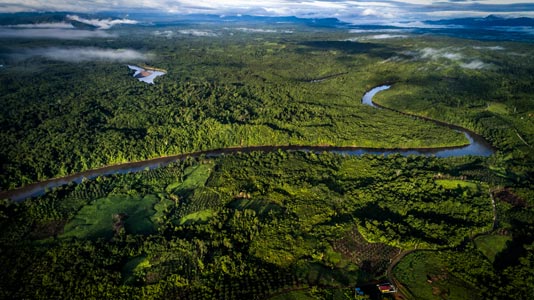EU REDD Facility (closed)
Forest loss and degradation profoundly affect forest-dependent communities, wild species, and the global climate. The Intergovernmental Panel on Climate Change reports that deforestation and forest degradation contribute to about 12% of global greenhouse gas emissions, making them significant factors in climate change. To limit climate change and preserve biodiversity, it remains essential to reduce the rate of deforestation and forest degradation, increase the amount of carbon stored in forests, and improve forest management.

Our objective: Reducing deforestation through improved land-use governance
The EU REDD Facility, which concluded its operations on October 31, 2023, was dedicated to addressing these critical challenges. From 2010 to 2023, the EU REDD Facility supported developing countries to improve land-use governance as part of their efforts to slow, halt and reverse deforestation. We contributed to the overall EU effort to reduce the impact on deforestation in developing countries.
Our work: Improving legal frameworks and enforcement, sustainable land use, finance and incentives, and transparency in supply chains
In all this work and through the various tools the Facility developed, we engaged with and promoted dialogue among people with varied interests in forests — from policymakers and business leaders to representatives from civil society and local communities. We also supported policymakers in Europe to implement new policies promoting sustainable land use and investment.
These ways of working align with the EU’s prioritisation of partnership approaches to help reduce pressures on forests in commodity-producing countries. Throughout the implementation of the EU REDD Facility, definitions and responsibilities were clarified, credible information for decision-makers was shared, and trust between partners fostered. This resulted in increased transparency and accountability in the forest and land-use sectors. Through these efforts, the Facility built an enabling environment for forest-friendly development and investment and helped countries to implement their targets under the Paris Agreement on climate change, also known as Nationally Determined Contributions (NDCs).
Lessons learned: Reflecting on the EU REDD Facility's Impact
Since its inception, the EU REDD Facility's ambition was to support dialogue and partnership between state and non-state actors, strengthening efforts to ensure tropical forests meet their potential to limit climate change.
The work carried out through the EU REDD Facility provided invaluable insights. Here is a summary of the key lessons we learned, which we hope will help to shape and accelerate future action in ending tropical deforestation:
- Clear and well-enforced legal frameworks are essential for land use.
- Participatory and informed land-use planning is key to reducing land conflicts and deforestation.
- Partnership approaches build an enabling environment for sustainable land use.
- Open, reliable information on global forest-risk commodity supply chains is needed to build trust on both sides of the trade.
- Consensus on definitions and data is crucial to track progress towards sustainability.
- Nationally Determined Contributions (NDCs) offer opportunities to raise the profile of forest and land-use governance.
- Community forestry can improve livelihoods and achieve climate commitments.
- Tracking investments in land use helps to deploy resources for supporting forest and climate objectives.
- Socio-economic factors driving smallholder land-use decisions must be considered.
- Commodity and trade approaches provide a powerful lever for governance reform.
Resources
For further information, visit the archived website of the EU REDD Facility.
This site serves as a comprehensive resource, documenting the Facility's efforts from 2010 to 2023 in supporting countries to reduce deforestation and forest degradation through improved land-use governance.
While the EU REDD Facility is no longer active and the information is not being updated, you'll find a wealth of knowledge here on its approach, key actions, and the valuable lessons learned. Explore sections like "Our Work" to delve into topics such as legal frameworks, sustainable land-use investment, and transparent supply chains, or visit "Publications" and "Tools" to access extensive resources generated throughout its operational period.
The EU REDD Facility, hosted by the European Forest Institute, was established in 2010. Its work has been funded the EU, Germany, Ireland and the Netherlands. In its early days, the Facility also received funding from France, Spain and the United Kingdom. The work of the EU REDD Facility came to an end on the 31st of October 2023.